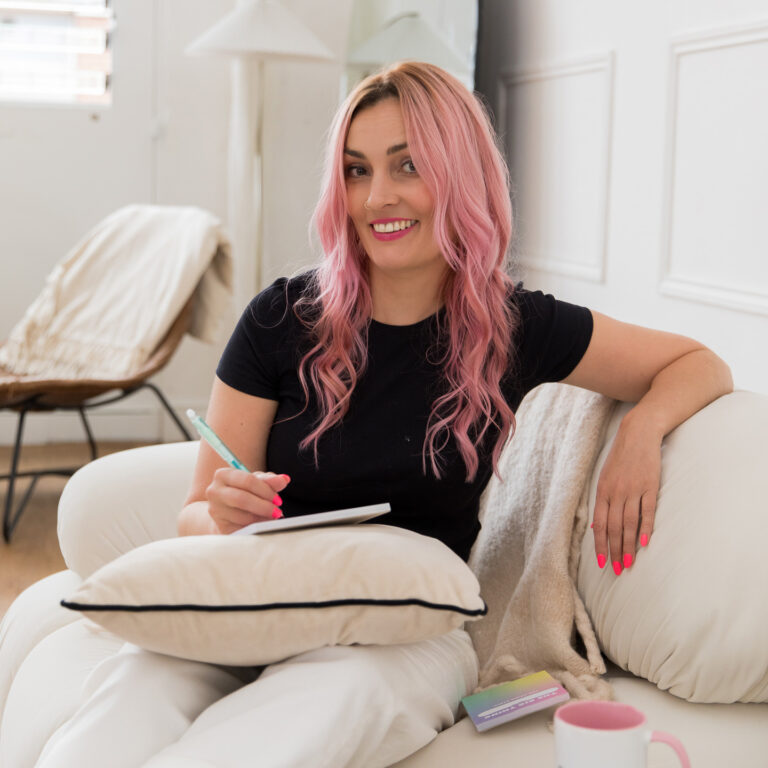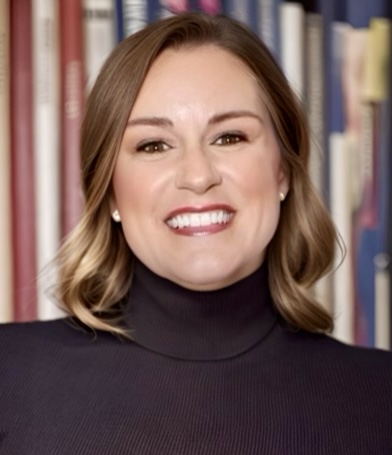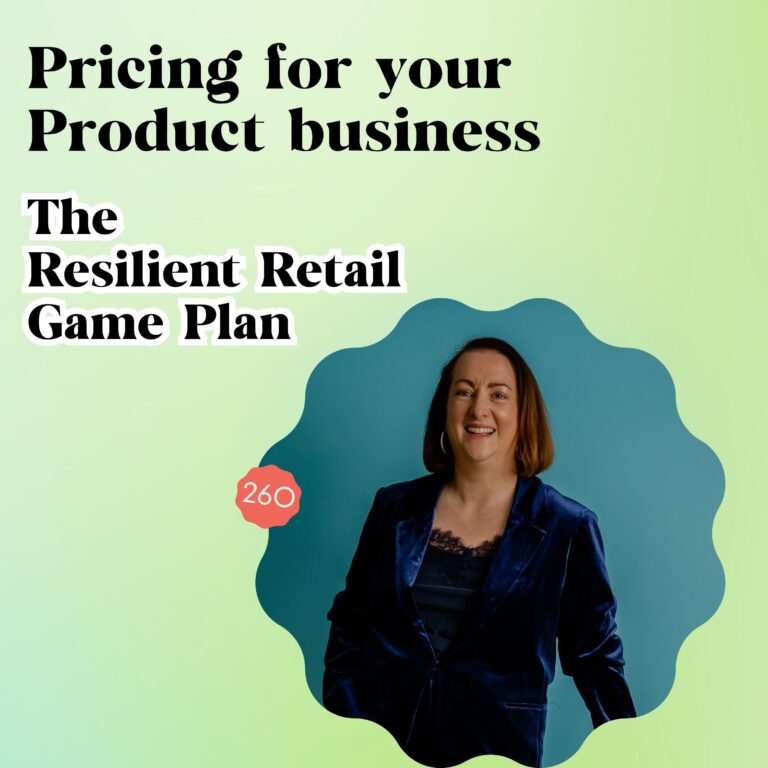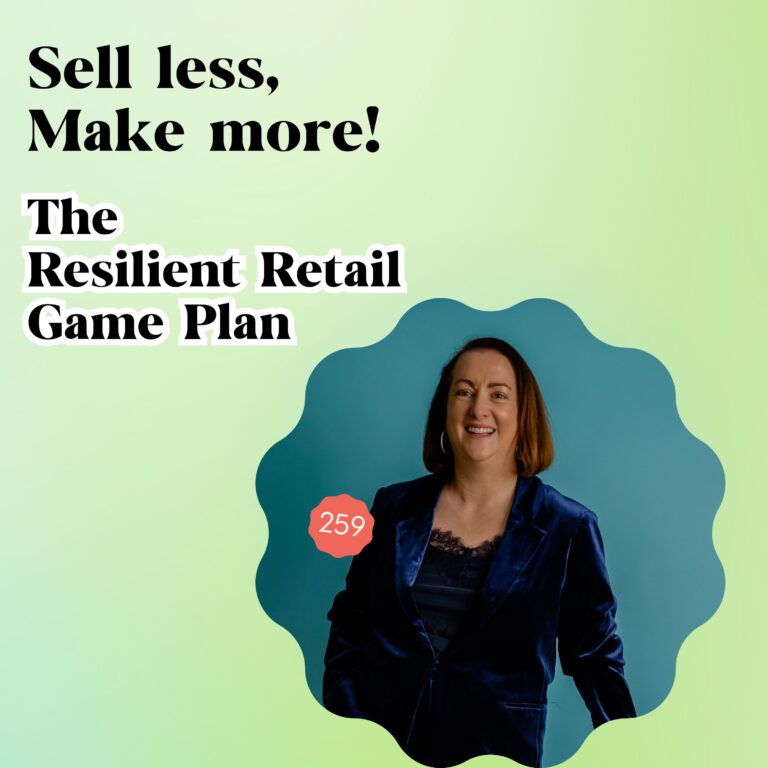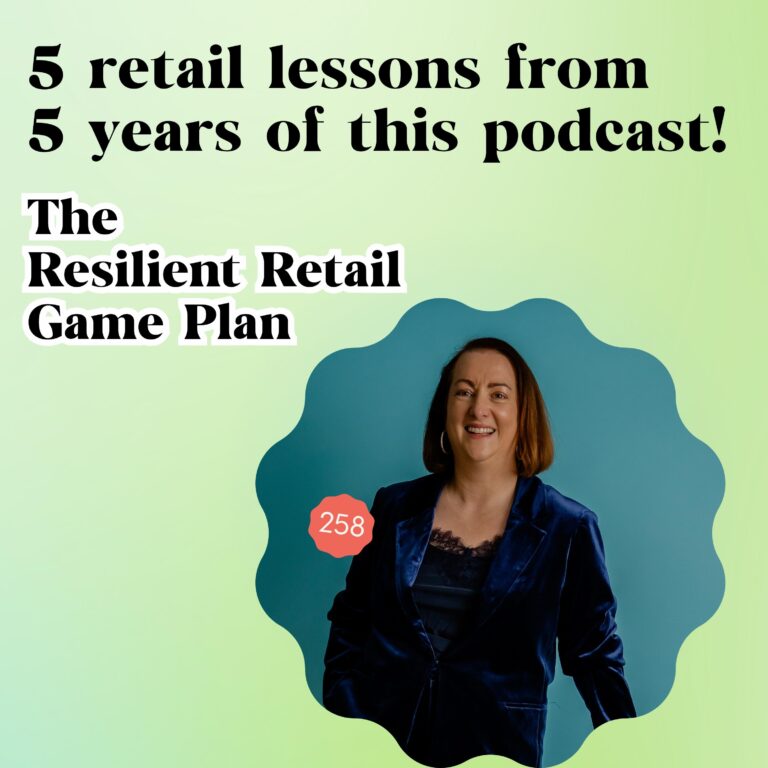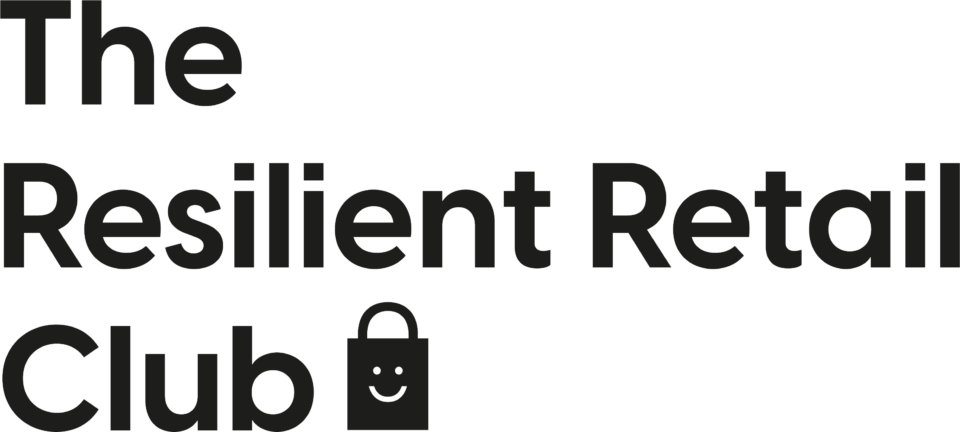Unlock the Mindset of Successful Retail Owners with Annabel Gonifas
Catherine Erdly: [00:00:00] What does it take to be a successful product business owner? Are there certain attributes that you can learn or is it something that you’re born with or not? That’s what we’re going to be exploring today on the podcast. Hi, I’m Catherine Erdly. I’m a small business and retail expert, and I’m also the host of the Resilient Retail Game Plan.
I’m so excited to welcome back to today’s podcast, Annabel Gonifas, who is a coach. And also she is the coach inside my mastermind program, the product business mastermind. We’re kicking off again for our January cohort. If you want to know more, check out the link in the show notes.
Welcome to the Resilient Retail Game Plan, a podcast for anyone wanting to start, grow or scale a profitable creative product business with me, Catherine Eardley. The Resilient Retail Game Plan is a podcast dedicated to one thing, breaking down the concepts and tools that I’ve gathered from [00:01:00] 20 years in the retail industry and showing you how you can use them in your business.
This is the real nuts and bolts of running a successful product business, broken down in an easy, accessible way. This is not a podcast about learning how to make your business look good. It’s the tools and techniques that will make you and your business feel good. Confidently plan, launch, and manage your products, and feel in control of your sales numbers and cash flow to help you build a resilient retail business.
Welcome back Annabel
Catherine Erdly: Welcome back to the podcast, Annabel. So good to have you with us. Do you want to just give everyone a really quick, brief overview of who you are and what you do?
Annabel Gonifas: Thank Oh, you very much, Catherine. Lovely to be back. I’m Annabel Gonifas and I run Gonifas Coaching. I’m a business coach and I focus on women entrepreneurs, helping them and supporting them to thrive in their businesses and also [00:02:00] personally.
Catherine Erdly: Absolutely. And you are an integral part of the mastermind as you have been for the last 18 months, which is more than 18 months now. Gosh, yes. Anyway, it’s absolutely fabulous having you as part of that. And I get some such great feedback from the mastermind participants about how fabulous it is working with you.
And the reason that you’re part of the mastermind, you’re just generally fabulous, is that everything I do with people is very, very practical. So I do a lot of the strategy, profitability, sales, structure and sanity is a phrase I’ve been using a lot recently. But putting a lot of that into place for people in their businesses.
But then you do a lot of work on the mindset piece or the kind of how people are feeling about the business. So do you think that there are some key traits that you see that really help people build a successful business.
Annabel Gonifas: Yes, definitely. And I think you’re right where you put in that, I love that structure and [00:03:00] sanity. I think I put in the vision and the clarity.
Catherine Erdly: I like that.
that
Annabel Gonifas: And they were actually the two words I wrote down this morning before speaking to you. So I think it’s that clarity. So the structure and the processes, and that sanity, and that framework, this is where I see the kind of doubling up that really benefits. Because without those, you haven’t got a building.
You haven’t got the timber to build a business. And when I hear the clients and they get these structures in place. These are really, really key in order to move forward and to scale and to grow and to gain confidence and all the great things. There might still be some barriers in place.
And I guess that’s the trade is focusing on the clarity of what they’re doing. There’s often like a massive forest in front of you. And as a great friend always says, you see the wood for the trees and that’s really what coaching does is that you start to [00:04:00] really get the clarity around kind of what you want as a business, what makes sense for you.
Looking at the vision, but why that’s important for you. Because we can’t just strive towards a vision, get there and then think, “okay, well, this isn’t actually what I wanted in the first place.” So really personalizing it as well and understanding the person. So in terms of the traits of the mindset, there’s definitely a lot of that, the clarity, the vision, the inner confidence, I think. The self belief, self respect sometimes.
The difference between self-belief and self-respect
Catherine Erdly: How do you see the difference between self belief and self respect?
Annabel Gonifas: Well, because I think that you can believe in yourself and you can believe in what you do. But sometimes you might have that because it’s a lot of like competence and expertise and knowledge. But the self respect is around the boundaries and saying no. I seem to have spoken to quite a few masterminders recently about boundaries on loads of levels. About boundaries on so that you don’t say yes to [00:05:00] everything.
Boundaries around screen time, boundaries around work and balance of life. And so I think that’s a self respect bit, like where you sit in the business, how it serves you and how you serve it.
Catherine Erdly: Oh yeah.
Annabel Gonifas: Rather than just being like, dragged along with your heels behind you going, okay, it’s okay. It’s okay when actually you’re doing it for you at the end of the day, aren’t you?
Catherine Erdly: Oh my goodness, that is so true. I feel slightly called out by that, but it’s okay. We’ll work through that. No, but I think it’s so interesting. You say that about the respect and the boundaries, because I do think that one of the things about the mastermind is that we quite often work with people.
How to navigate fast growth with sustainability
Catherine Erdly: Somebody asked me recently, like, what kind of reasons do people join the mastermind? What kind of things do they come to you for? And I said a lot of people come at a sort of crossroads. Sometimes it’s a crossroads because it’s grown hugely but they just [00:06:00] can’t keep going the way that they’re going because they are absolutely at the point of breaking because probably something to do with what you’re talking about there, that self belief and self respect.
Because if you grow fast, it can come with a huge amount of self belief because you’re like, wow, okay, we’re doing this. But then equally, you’ve probably got there to that fast growth point by giving it absolutely everything. And then, like you say, it’s that self respect that comes in where you kind of go, okay, all right, I gave it everything.
But actually, I just can’t. You have to work out a way that you can keep the forward momentum without you kind of being, I feel like I’m mixing my metaphors here, but anyway, like without you being kind of like crushed in the mechanisms, you know what I mean?
Annabel Gonifas: Oh yeah.
Catherine Erdly: The momentum’s going, but like oh my goodness, I’m getting just sucked into this. Now it’s like a bigger machine, right?
Annabel Gonifas: It’s the same machine, but it’s grown. It’s like, you know, it’s gone from like a Ford to a whatever, we’re moving up the cars. And you end up wanting to be, I don’t know, in a Lamborghini or something. But at the same time, so the engine is there. But it’s a sustainability of [00:07:00] the business. I spoke to someone the other day and I said, what do you do?
And he works for a building company merchant. And he said he was in sustainability. And I was like, Oh, right. So is that to do with like the timber and the trees? And he was like, no, I’m the sustainability officer for the business in order to see it through actually to keep the sustainability. I was like, Oh, it’s a family run business.
It’s been going for three generations. I was like, oh. That just wasn’t in my head space when he mentioned sustainability, but sustainability for business, you know, the end game, the long road, the long term approach is really huge. And I think then it flips back to what you do, which is often what I say to people as well. With Catherine, with you putting in all the processes and the frameworks that they can rely on and that become more intuitive to them.
Because often, especially, creative businesses, but any businesses grow lots of it is about [00:08:00] medium viable products, or it’s about learning on the hoof. It’s about learning the experience and then kind of getting to a point that you say where you go oh, okay, what do I do now? This is not working.
And I think it’s really important to say as well, burnout is a thing. And we live in a crazy world. We’re having to develop much quicker than we’ve ever had to develop. And I think so making sure that you are okay in terms of your being. You are the head of your business. You are the captain of your ship, so making sure that you are okay ’cause otherwise it’s not, but burnout will happen and it ‘s much harder to get out of.
Catherine Erdly: Yeah, absolutely. I completely agree. And I, the phrase I always think about is that what got me here won’t get me there. And I think that that’s so true for a lot of people. And coming back to why people join the mastermind, I mean, absolutely for fast growth. Sometimes it’s that the growth has slowed, but then they feel like, right, I’ve got to either do something different or change direction completely, or I [00:09:00] just need to work out what next.
Overcoming the invisible walls and mental blocks
Catherine Erdly: And sometimes it’s that the business has been doing well may not have been like on a fast growth trajectory, but it’s got to a good size. But it just feels really, really difficult for the person running it. So a lot of the time, I think that the mastermind, a lot of it’s to do with the way it feels for people. Like, do they feel overwhelmed?
Do they feel lacking in confidence in their decisions? Cause sometimes you can start off and I’m going to ask you a little bit more about this, how your traits can fluctuate over time. But I think sometimes you can start off with a lot of self confidence and then all of a sudden hit a period where you’ve got lots of self doubt.
And I was talking to some of the masterminders who, at the end of their six months, and they were saying about how again, a lot of the changes for them were about confidence, were about I felt really lost. I felt really unsure where I was going, and now I feel a lot clearer. And I think that a lot of that does come to the fact that we change and we grow as business owners and our businesses change.
And sometimes we can overlook things like not [00:10:00] paying ourselves quite enough at the beginning, but you definitely do get to the point where a certain number of years in, if you’re not rewarding yourself financially from your business, that also makes it talking about sustainability. I think it’s a great way of talking about it.
Like that’s just not sustainable really, is it? In the long term, to work as hard as small business owners work? Let’s face it. We all work really hard and to not be financially rewarded for it. I think it’s really difficult or even if you are, but you feel constantly like you’re on a roller coaster and not in a good way.
Annabel Gonifas: Yeah, I think that would resonate with a lot of listeners. Absolutely. And a lot of people coming into it or a lot of people starting out in business. Or as you say, you know, get to a stage and then you realize you’re not actually paying yourself and what’s the point? So then it goes, you know, then we would do some work around values and saying to people, you know, one of your values, I would say you have three to five.
If being financially independent and stable is really important to you. That’s value. And [00:11:00] often, I’ve had this about three times with people where they said, am I allowed to put that down? Yes, yes, you are. So then there’s some work around money as well. In fact, money also comes up quite a lot. But then there’s some work around money and just that you know, cause people say ooh, I’m not sure I’m allowed to say that.
No, no, you really are. You’re in business. You really are. We’re doing it to make money. And again, that’s where it ties back into what you do because you’re able to help them excel on the profitability. So once again, you get that kind of structure around the stock or whatever it is on the profitability and then the mindset around it as well.
That’s a winning combination.
Catherine Erdly: That’s really fascinating about the whole piece, about the money mindset. I think that is so interesting because one of the things that I see a lot of the time is people tend to not take enough money out of the business for various different reasons.
Sometimes it’s just not feasible. But often the reason it’s not feasible is because they plowed it back into stock and somehow people [00:12:00] have this idea that if you are giving it back to the business, that’s okay. Actually, what if you just take it out? And it often makes the business leaner and stand on its feet more.
If you insist on taking that money out. There’s always going to be a “to-spend” list in a business, right? You’re always, always, always going to be spending. But I think sometimes getting into that mindset where you can see everything mapped out clearly. Cause that’s part of what I do with people is I put in things like cashflow spreadsheets, so you can actually really see what your money is going to be each week. But then also insisting, right, well, I’m going to take that out for myself and if that means I have to buy less stock, well actually, that’s probably the best thing for the business because so many people overbuy on stock.
So, okay, so we talked about clarity vision. We’ve talked about self belief. Self respect. Do you think some people naturally have these traits or does it vary across time according to circumstances? So we touched on, for example, how self belief can [00:13:00] fluctuate.
Rediscovering the self-belief you already have
Annabel Gonifas: Yeah, I think everyone naturally has it. It’s what is there in a narrative and what they believe about themselves. Or it’s taking away the limiting beliefs that they might have accumulated as they grow up through childhood. And often it’s around family, siblings ,in your educational setting, university, your first jobs often have quite a huge influence on your mind.
So I believe that everyone has, as humans, these traits. But they can have been dampened down a lot by listening to other people’s voices. And so it’s sometimes a case of stripping that back and actually finding that person, you know, nurturing that. Sometimes you get someone who has a huge amount of self belief in one aspect. But actually doesn’t in the other and therefore, you know, so I think that proves that I think we all have it. It’s just a case of finding it again.
Catherine Erdly: Do you think you have to have a certain amount [00:14:00] of self belief to even start a business?
Annabel Gonifas: Definitely, definitely. And if a certain amount of drive and focus and ambition and all of those things, you know, because it’s a risky thing, isn’t it? We all know that. Just because you don’t have your regular paycheck coming in, you’re not doing what you’re told. You’re having to think creatively.
There’s so many different hats you have to wear. It’s all consuming.
Catherine Erdly: Yeah.
Annabel Gonifas: And so it takes a certain mentality, but then what’s really exciting, I think, is when you’re able to watch that grow. And for them to be able to see their true potential.
Catherine Erdly: Yes, yes. So how does that kind of present itself? You talked about where people maybe have got this vision, this clarity, the self belief. They’ve had it kind of dampened down. Like how can you tell that when you’re talking to somebody? Is it always like, oh, okay, hang on a minute.
Something’s happening here, something’s going on here. Or do you always have to kind of like, dig in? Or does it sometimes pop up when you are [00:15:00] not even expecting it?
Annabel Gonifas: That’s a really interesting question. It pops up in different ways. So, it will pop up in language that we use. We all use different language. You know, you and I will both be using different language in order to portray what we’re saying. And so it kind of pops up in bits that aren’t said. And then it’s also pops up, it’s often certain words that get used again and again. So I’ll say, “Oh, I can hear that you’re saying this again.” It’s like, “Oh yeah.” So sometimes you have to dig much deeper to find out where that’s come from. But sometimes it’s very much, it can be quite quick to unravel. I’m trying to give you an example, but I can’t think of one off the top of my head.
Also, everything’s very confidential, so I don’t really want to kind of say anything, but it can really be from where the people are putting a glass ceiling on top of themselves. That can occur.
Catherine Erdly: Yes. Okay, so I’ve got an example. When I first started my business, I did quite [00:16:00] a lot of work on money mindset. Like you said, kind of unpicking relationship and beliefs about money and what that meant. And I remember that somebody.
There was somebody was doing affirmations, something like I can have anything that I want. You know, and you had to repeat it was probably like a guided meditation or something. And then I filled in like, I can have anything I want as long as I work hard enough for it.
And I was like, huh. Okay, all right. And it was just quite funny because I literally like that to me was the end of that sentence. And it just was a good highlighter to me that like, okay. And to be honest, I still have to convince myself that it’s not true. But it’s like you only get, you can only make money if you work really hard.
But obviously there’s lots of examples of people who just, you know, their money makes money, like it accrues interest. Like there’s lots of different ways of making money that don’t involve a huge amount of hard work. But for me, that was an example. Is that kind of what you’re saying? Like.
Annabel Gonifas: Yeah, absolutely. They’re [00:17:00] like these bedrock assumptions that we have for whatever reason that we might have been taught. Absolutely, one of those. And so it’s a case of bedrock. challenging that and understanding that not everyone thinks that way, because it’s your bedrock assumption or was your bedrock assumption.
You kind of assume that’s how the world works, but it’s when you can start challenging it. And I guess having that paradigm shift of, ah, is that not the case? Exactly like you say, can you put money in a bank and it accrues interest and it makes more money. That sounds quite easy. Do you know what I mean?
There’s these different things, and I’ll give you two classic examples as well. One is, and this happens a lot in relationships, it’s peace over honesty. So as long as you don’t really say anything that you really feel, everything will be more peaceful, and therefore it’s better than actually telling the truth.
So that’s a kind of bedrock assumption and you can start to challenge that because sometimes you can have the best outcomes when people actually start to tell the truth and are able to communicate [00:18:00] more freely around it. And another one, which I’ve often thought is I have to make everything okay for everyone.
So it’s a real woman thing that we have to make, although I was talking to a male friend the other day and a business leader, and he absolutely felt the same. That you have to make everything okay for everyone. It’s like, well, is that your responsibility? And that, you know, when you start to take that away as well, it can be a huge amount of pressure off your shoulders.
Catherine Erdly: Yeah, yeah. For sure.
Annabel Gonifas: That actually, it’s not. And it might be harder for the other people, but they’re still humans and they’ll still be okay.
Catherine Erdly: Yes. Yeah, yeah, for sure. So my degree was international business, and one of the things that we did was a module about intercultural relationships, in terms of businesses. And I always remember them talking about invisible walls. It was based, you know, it was very much looking from a big business perspective.
It was talking about multinationals where they might have multiple offices across the world. One of the things they talked about was invisible [00:19:00] walls, where somebody would just not understand why somebody else was acting a certain way. It just didn’t make any sense to them or they’d run up into, they try and get someone to do something and that person would say, yes, yes, yes, yes.
And then just not do it or something like that. And it felt like they were running into an invisible wall because what was really happening was that their understanding and assumptions about work and authority and setting priorities and getting things done was very different to somebody else’s, because they came from a different cultural background.
And I often think about that concept because I think we often run into our own invisible walls. So what I think is interesting is sometimes, for example, I’ll be working with somebody on something and why I think it works so well, working both of us together is that we’ll talk about putting something into place and then people, for whatever reason, just don’t find it possible to put that thing into place.
And it’s almost like we have to take a step back and go, what’s going on here? Is it actually just not the [00:20:00] way they like to work, which you obviously have to work around it. People have their own preferences, but sometimes I think it’s these invisible walls that they, you know, like I had that example where it’s because I heard the phrase and the end of it popped into my head and I say, “Oh, hang on a minute, what’s going on here?”
But I think there’s lots of things like this that we maybe just aren’t even aware of on that sort of conscious level. A lot of the time.
Annabel Gonifas: Absolutely, it’s how it works. Yeah, we do and I see that where you put the structure in place for some people and they find it really hard to implement. And I think it is working around that and working as to why? What’s the fear of putting it in place? Or what’s the barrier or why isn’t it working?
And it might be that they work in a really different way. So maybe spreadsheets aren’t their thing, but then we look more creative ways. Even making spreadsheets more colorful, creative ways so that you feel as though you want to get into that spreadsheet. But I often find when people start to see the benefits from it, that’s like a motivator in itself. I [00:21:00] quite like the spreadsheet.
But the, I mean, sometimes, you know, when you talked about the traits and I think one of the traits is around focus, being focused and with some people, the focus actually needs on needs to be practiced on staying focused.
Catherine Erdly: Yes.
Annabel Gonifas: Because, you know, as creative business owners, there can be these tangents that people get pulled from here to there or any business owner really. And there might be quite a lot of work to do around staying focused.
Catherine Erdly: Fear of missing out.
Annabel Gonifas: Fear of missing out, fear. And also, you know, these ideas coming into people’s heads, ‘Oh, I must do that. I must do that.” And actually what are they not doing in that moment? If you start taking your resource or your energy away from something and putting it into something new or something different or something easier, then you’re not staying focused on the task at hand.
No, we totally get off on [00:22:00] tangents.
Catherine Erdly: And what about things like clarity and vision? I mean, it’s interesting to think of that as a trait. I feel like sometimes that can be almost be something that kind of goes in and out of focus. Like sometimes you feel really focused, really clear.
You have a really clear vision, right? This is what I’m doing. This is where I’m going. And you go off almost like a, you know, like a greyhound after a rabbit type. Right after heading off to this. And then other times it can feel like, actually, what am I doing? Or feel very distracted or feel very disconnected from it.
So do you see that the clarity and purpose is something that kind of can waver in and out?
Annabel Gonifas: Yeah, 100%. We’ve also got to remember this idea of having a positive clear mindset isn’t, it’s not like a mountain that you climb and you reach the top and you put a flag in it and you’re like, “yep, I’ve done it. I bagged that one.” It’s like a continual thing. And I think that even in the next 40 years, we’ll all still be, there will be things which are cropping up.
That’s how minds work. And it’s [00:23:00] almost, that’s the challenge in itself is how you respond to react to challenges, which will happen. They will naturally come up. I was told a really great saying once, which was expect the unexpected. So I think because we go ahead thinking as long as we’ve got a plan in place, that’s what will happen. And we know exactly what’s going to happen.
Catherine Erdly: Yeah.
Annabel Gonifas: Down the line. But if an element around expecting the unexpected, just knowing that that curve ball’s going to come, we don’t know what it is, could be positive, could be a real challenge, but we know it’s going to come.
And it will wobble us. It will totally change our clarity and our purpose and our vision. But it’s a case of how we respond and gaining strength and kind of control in that situation. What can we control? What can’t we control? Business is like sailing a ship. I have to go to ships, but it is.
You set your sights on somewhere. And that’s where you’re heading, but you are going to tack along the way. You don’t [00:24:00] want to do too many jibes because that’s a real pivot. You can do small pivots, but a massive pivot away from your initial vision is quite turbulent can be, but at the same time, sometimes that’s what’s needed.
Catherine Erdly: Mm-hmm This is working out what that is. Well, whether it’s needed or whether you’re just doing it and expanding unnecessary energy.
Annabel Gonifas: Yeah, and money and resources and all the things. But sometimes it will be needed. So it’s a case of getting real clarity and confidence around those decisions. And interesting, actually, sometimes those can be gut decisions. Which I believe are very important, but if you just swing with your gut. And you’re not, again, looking at the facts and the processes and the systems and all the things that make sense. Then you can be flying off the seat of your pants, slightly.
And again, it’s that combination of the two. It’s like, my [00:25:00] gut’s really telling me this, but you’ve got to look at the facts. You’ve got to look at all the work that you do as well, and then come with quite a kind of a calm, it’s a much more calm way of making a decision.
Catherine Erdly: Yes, for sure. Yeah, absolutely. Sometimes you do have to make big decisions, but it can be done in quite there’s actually quite a lot you can forecast and calculate and big believer in get everything mapped out, make yourself a model, and then you can play around with the numbers as part of your decision making process.
I think that it’s pretty good. I mean, that’s how I think if I’m going to make a business decision, I think with the numbers. I start with the numbers and then I kind of work from there. And I think that, you know, obviously you have to use gut as part of that, but I think what makes people feel really untethered. It’s just not really knowing the number side. And so they feel like they’re sort of taking action or in that, or in action, and they don’t really know if it’s going the right direction. So it’s a great combination, I think, to do that work where we get really clear about the business and [00:26:00] what’s happening in it and what we can play around with.
And then they’ve got you working with them on the clarity and the vision and the understanding. Like what’s blocking them. And I think it’s, no, I think it’s a great combination.
Annabel Gonifas: And going on to those, sorry, going on to the figures, I think from the feedback I get when I’m speaking to people, it can so often be a case of in the past, they just used to spend or order stock just because it felt right. Or because they thought they should, or because there was a gap, or because they’ve got 10 minutes and they just might as well order some stock.
And I think it’s those decisions, as you say, made with that clarity and foresight and having it all mapped out and being able to tweak as well. I think people really like being able to tweak the figures and see how different things pop up and then be able to focus on what they’re spending. So I think that’s really, really key.
Habits to cultivate a strong business mindset
Catherine Erdly: Yeah. Clarity and control, for sure. Those are the key things. So we talked about how some people have got natural elements of these key traits [00:27:00] and some people or many of us have them, but they fluctuate. Are there particular habits or activities, for example, that can help people cultivate a really strong, successful business mindset.
Annabel Gonifas: Yeah. I mean, there are many, many, I think the three that come to mind is working out where you get your energy from, working out where you re energize which is more important than I think people actually think. And yeah, what works for you doesn’t necessarily work for someone else. So whether it is getting that, because essentially what you’re trying to do is get that stillness of mind.
When you get that stillness of mind, it’s where the really good and more unconscious thoughts will arise and you’ll be able to sift through the problems that you’re facing. So whether that is, just sitting in a dark room, whether it’s reading a book, whether it’s going out, socializing, whether it’s walking in nature, whether it’s swimming or pumping in the gym or [00:28:00] whatever it is, giving yourself space to re energize because otherwise you go into that burnout mode.
And also, when you’re exercising or when you have that stillness, you’re right in your left brain calm as well, because often people will come to me saying their mind’s feeling like a hamster wheel. Or like a like a whirlwind and they just can’t, they’ve got this inner chatter that just doesn’t stop.
So working out where it works best for you to re energize, whether it’s 10 minutes, whether it’s a case of getting up earlier before anyone else is awake in your house. If it means getting up at five instead of six and just having that peace, it might seem quite mad for the first month, but after that you just get that sense of space, or maybe it’s late at night.
So I’d say that’s a really good habit to get into, just being able to zoom out and think, okay, what am I really looking at here? And that is a habit. You know, it’s a way of meditation, I guess. Getting in the flow, [00:29:00] quietening your mind. Another good habit is reflection and learning.
Sounds really boring. But without it, you’re just kind of steamrolling.
Catherine Erdly: Mm hmm.
Annabel Gonifas: You’ve got to learn and reflect. And sometimes the learnings can be a bit icky. You don’t really want to acknowledge the fact that maybe it was you who could have done something differently. What learning can you take from it? How do you want to react in that kind of situation next time?
Who do you want to be next time when you’re reacting? And one big one is what can you control and what can’t you control? And keep on asking that really, those two very simple questions. Or kind of just ground you again. What can you control? What can’t you control? Because otherwise you can go off spiraling about things which are, which aren’t really in your control. So they are a waste of time and energy.
Catherine Erdly: Yes, totally. The last few years have just shown us so many things that we can’t control. [00:30:00] I completely agree. And it can be a really, really draining. And if you spend too much time in spaces where people almost, I think sometimes the small business world, we can get into a bit of a negative spiral and it’s really useful just to keep bringing it back.
Like you say, what can I do? What actions can I take and focus take
Annabel Gonifas: actually that, that, that mentioning draining as well, I think that goes back to where you re energize as well. You know, re energize with radiators, not with drains. If someone, if you’re surrounded by people who are, you’re all bringing each other down or you’re got this negative spiral. It’s really hard to stay afloat mentally, really hard.
Whereas if you’ve got people who, which is part of the mastermind, isn’t it? That you’ve got everyone. And again, that’s what I hear is people are, you’re kind of, you’re being buoyed and you’re being able to put a problem forward and have other people who are going through the same thing, be able to come up with suggestions or not even suggestions.
It’s more what they’ve [00:31:00] done. So that’s a really good place if it works for them to feel buoyed and to feel re energized. So those, those would be my two key habits. There was one more, I can’t remember what it was. I know what it is. So another key habit would be focusing really on so these, these are all kind of mind habits, but mind practices.
So focusing on what success means for you because people get very caught up in what success for others look like. So it’s really focusing on what success means for you and just, it’s really hard, but just keep going on that one.
Catherine Erdly: Oh, that’s such a good point. Yeah, I love that because I think, everything I do, whether it’s the mastermind or whether it’s the membership or whenever I’m working with people, that for me is the most important thing. Not what does a successful business look like generically, but what does it look like for you?
And I think that’s such an important question for us all to ask ourselves, because the actions we need to take are very [00:32:00] different depending on what we want the outcome to be. And I think it’s also absolutely fine to not want to be a household name and it’s absolutely fine to want to be a household name.
I completely support both ends of the spectrum. I just think we all have to keep checking in with ourselves. And I was going to say the habits as well. The analogy that I really like is, somebody said you wouldn’t brush your teeth once and then think that was it. You were done with oral hygiene.
Annabel Gonifas: brilliant one!
Catherine Erdly: And I feel like, yeah, I feel like that’s the same thing with the mindset piece as well, isn’t it? It’s like, you’ve got to keep up with these. Sometimes it can feel frustrating to think, well, I worked out my vision. Why do I just not feel clear and happy all the time? And it’s like, okay, well, because it’s something you have to work on every day. So, that’s definitely the joy of the mastermind.
Annabel Gonifas: I think with that, so we’re coming into January now, and there’s that new year, new you, you know, vision boards, whatever. On one aspect, I think this is something that we [00:33:00] shouldn’t just say for the January, we should kind of be constantly doing all year. Having said that, you know, now that we’re in this kind of rundown until January, I literally see it like a hill and going up.
I do feel January is a good reset time. Especially in the northern hemisphere. Everything’s quite dead, but underneath the surface of the soil, things are happening, things are starting to grow again. And it is a good time to rethink. So if you have one month, whenever it is throughout the year ,that you’re able to kind of really reset. It doesn’t have to be January, but a vision it’s not going to last you really, I wouldn’t have said more than 12 months.
You can have like a two, three year vision or five year vision or a 10 year vision, but you’ve still got to have those smaller visions. Keep on moving forward. Cause as I said, expect the unexpected things are going to crop up along the way. And you have to be open to how you react to all of that.
Catherine Erdly: Thank you so much, Annabel. And I just [00:34:00] say, if you’ve enjoyed our chat, then inside the mastermind, then you get three one to one sessions with Annabel and you also work on people’s personality profiles, which is fascinating as well. And thanks so much for joining me today.
Annabel Gonifas: Thanks so much, Catherine. It’s lovely to speak to you.
Catherine Erdly: Thanks so much for listening. I hope you enjoyed today’s show. As I mentioned, if you want to know more about the mastermind, then do head to the show notes where you can get the link to sign up for a discovery call. We are kicking off shortly and we have just got a few spaces left.
So if you’re interested, then go ahead. Do grab a call and let’s chat. Otherwise, I hope you have a great day. Don’t forget to like, and subscribe to the podcast. You’ll be the first to know about each new episode coming out each Thursday morning.

